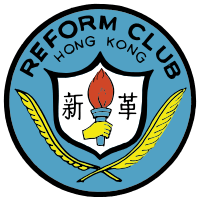Reform Club of Hong Kong
Reform Club of Hong Kong 香港革新會 | |
|---|---|
 | |
| Chairman | Brook Bernacchi |
| Founder | Brook Bernacchi |
| Founded | 20 January 1949[1] |
| Dissolved | Around 1995 |
| Ideology | Liberalism |
| Political position | Centre to Centre-left |
| Reform Club of Hong Kong | |||||||||
| Traditional Chinese | 香港革新會 | ||||||||
|---|---|---|---|---|---|---|---|---|---|
| |||||||||
The Reform Club of Hong Kong (Chinese: 香港革新會) was one of the oldest political groups in Hong Kong existed from 1949 until the mid-1990s. Together with the Civic Association, they were the closest to opposition parties in Hong Kong during the post-war colonial period.
History
The Reform Club was founded by expatriate barrister Brook Bernacchi in 1949 the midst of the debate over the Young Plan, a plan for wide constitutional reform in Hong Kong. The immediate target of the Club was to campaign for direct elections to the Legislative Council of Hong Kong.[2] Different from the Hong Kong Chinese Reform Association which was set up during the same time with the similar causes, the Reform Club was dominated by expatriates.
For decades the Reform Club and the Civic Association dominated the municipal politics as they provided most of the elected members of the Urban Council. It advocated more representative government in the territory and the improvement of public sector social services. In 1960, the two groups formed a coalition and sent a delegate to London to demand direct elections to the Legislative Council. In 1979, the Reform Club threatened to boycott elections if the Urban Council would not receive a majority of elected members and universal franchise was extended to all Hong Kong citizens. In 1982, it took part in the elections for the newly established district boards in the urban districts, which significantly extended the franchise.
Before the expansion of the franchise, the Reform Club had 15 members in the Urban Council 1983. But the Reform Club's influence in the Urban Council reduced during the 1980s. Following the 1989 municipal elections, only five Reform Club members remained due to its lack of grassroots support. The Reform Club and Civic Association were gradually supplanted by the new pro-democracy groups including the Hong Kong Association for Democracy and People's Livelihood and Meeting Point. When at the 1995 municipal elections Brook Bernacchi retired, the Reform Club ceased to be active in the Hong Kong political scene.
Notable members
- Brook Bernacchi
- Cecilia Yeung
- Chan Shu-woon
- Charles Edgar Loseby
- Elsie Elliott
- Henry Hu
- Kan Yuet Keung
Election performance
Municipal elections
| Election | Number of popular votes |
% of popular votes |
UrbCo seats |
RegCo seats |
Total elected seats |
|---|---|---|---|---|---|
| 1952 | 2,199 |
33.58 |
1 / 2 |
- | |
| 1953 | 6,374 |
71.25 |
4 / 4 |
- | |
| 1954 | 7,773 |
79.64 |
4 / 4 |
- | |
| 1955 | 3,283 |
89.62 |
4 / 4 |
- | |
| 1956 | 17,085 |
56.97 |
6 / 8 |
– | |
| 1957 | 11,716 |
43.50 |
5 / 8 |
– | |
| 1959 | 12,030 |
47.67 |
4 / 8 |
– | |
| 1961 | uncontested | uncontested | 4 / 8 |
– | |
| 1963 | 5,177 |
39.43 |
3 / 8 |
– | |
| 1965 | unknown | unknown | 5 / 10 |
– | |
| 1967 | 9,789 |
24.90 |
4 / 10 |
– | |
| 1969 | 16,571 |
49.22 |
3 / 10 |
– | |
| 1971 | 6,139 |
16.22 |
3 / 10 |
– | |
| 1973 | 25,709 |
55.14 |
5 / 12 |
– | |
| 1975 | 6,141 |
12.41 |
3 / 12 |
– | |
| 1977 | 13,249 |
41.05 |
3 / 12 |
– | |
| 1979 | 9,579 |
18.76 |
3 / 12 |
– | |
| 1981 | 7,291 |
28.29 |
2 / 12 |
– | |
| 1983 | 13,894 |
15.38 |
3 / 15 |
– | |
| 1986 | 24,486 |
6.95 |
2 / 15 |
0 / 12 |
2 / 27 |
| 1989 | 13,404 |
6.31 |
2 / 15 |
0 / 12 |
2 / 27 |
| 1991 | 9,045 |
9.45 |
2 / 15 |
0 / 12 |
2 / 27 |
District Board/Council elections
| Election | Number of popular votes |
% of popular votes |
Total elected seats |
+/− |
|---|---|---|---|---|
| 1982 | 13,644 |
3.83 |
2 / 132 |
|
| 1985 | 39,929 |
5.77 |
17 / 237 |
7 |
| 1988 | 13,572 |
2.13 |
5 / 264 |
5 |
| 1991 | 2,136 |
0.40 |
1 / 272 |
5 |